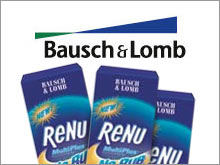|
Bausch sold ReNu in U.S. knowing problems in Asia
Contact lens maker sees stock price drop
NEW YORK (CNNMoney.com) - Bausch & Lomb stock fell after the maker of contact lenses said it knew about problems with its ReNu contact solution and had stopped selling the product in Asia months before it stopped selling the product in the U.S. Bausch (down $1.28 to $47.70, Research) stock price fell Thursday morning following reports that Hong Kong authorities had told the Rochester, N.Y.-based company about eye infections among users of its contact solution in November, 2005.
"Bausch & Lomb received information in November 2005 from The Hong Kong Medical Device Control Office (Dept. of Health) that it had noted an increase in hospital admissions due to contract-lens-related keratitis from June to September 2005," read a Bausch statement, provided by spokeswoman Meg Graham. In the U.S., Bausch & Lomb only stopped selling ReNu with MoistureLoc, the product in question, on April 13, 2006, stemming from the FDA's investigation of a Greenville, S.C. manufacturing plant and to eliminate consumer confusion. The FDA started its investigation on March 22 and is testing products, environmental factors and raw materials at the plant. The FDA has recommended that users of contact solution switch to a different product for the time being. The company had stopped selling the product in Singapore and Hong Kong in February, 2006, after reports of a spike in infections had emerged in Singapore, and after Hong Kong authorities reopened their investigation into the product. "At the time, those were the only two markets [Hong Kong and Singapore] that were reporting to us any unusual spikes in reports of suspected Fusarium infections," said Graham, in a written statement. "Bausch & Lomb took the most responsible and conservative action at that time, in the absence of any scientific data and in the interest of consumer health and safety, and voluntarily withdrew the product until there could be an investigation that provided some scientific information to determine if these reports represent an actual increase in Fusarium infections and determine if there is any association between the cases and any product." Reported infections
Bausch said there were seven reported cases of Fusarium keratitis among 25 users of the contact solution, but added that reports from Hong Kong authorities were incomplete. Bausch said it reported this to the Food and Drug Administration. Hong Kong authorities reopened the investigation after additional reports of fungal keratitis among contact lens wearers emerged in Singapore in mid-February, 2006. The FDA said it is investigating the Bausch manufacturing plant in Greenville, SC, by testing products, environmental factors and raw materials. The FDA has recommended that users of contact solution switch to a different product for the time being. "At this point, our entire effort is focused on cooperation with the FDA and the CDC in their investigations, and our investigation in trying to figure out what's at the bottom at the fungal eye infection," said Bausch spokeswoman Graham. Bausch has not released fourth quarter, 2005 figures, but UBS analyst Benner Ulrich estimated that ReNu contact solution sales totaled $100 million to $150 million worldwide, a fast-growing and profitable but relatively small fraction of the company's estimated total of $2.4 billion. If there is a proven link between the infections and the contact solution, but it turns out to be a manufacturing problem, Bausch could have the problems addressed and the product back on the market within "several quarters," said Ulrich, who rates the stock a "neutral." But if it's a problem with the formulation that requires a complete product re-formulation with a whole new submission to the FDA, than it could be at least 18 months before the Bausch gets the product back on the market, said Ulrich. "If there is problem with the formula, they've got potential downside to the stock," said Ulrich. Fusarium keratitis is a rare but serious fungal infection of the cornea, according to the American Academy of Ophthalmology. The infection causes the following symptoms: blurry vision, redness and pain in the eye, excessive tearing or discharge from the eye, and increased sensitivity to light. Recalls have become common in the health care industry. In September, 2004, the New Jersey-based drug giant Merck (up $0.36 to $34.68, Research) withdrew its arthritis painkiller Vioxx from the market after a study showed an increased risk in heart attacks and strokes. The withdrawal triggered a drop in stock value, and the stock is still down 24 percent from its pre-recall level. Also, Merck faces about 11,500 lawsuits from former Vioxx users or their families who blame the drug for fatal and non-fatal heart attacks. Merck has been held liable in two cases that have gone to trial, but was not liable in two others, and there was a split verdict in another. In July, 2005, Guidan (unchanged at $80.10, Research)t, a maker of implantable defibrillators, recalled tens of thousands of pacemakers because of faulty sealants that allowed moisture to damage the devices' electronic circuitry. Guidant's stock suffered at the time, but it's now trading higher, following a merger with Boston Scientific (up $0.18 to $23.24, Research). Ulrich of UBS does not own shares of Bausch stock.
To read more about the recall, click here. |
|

